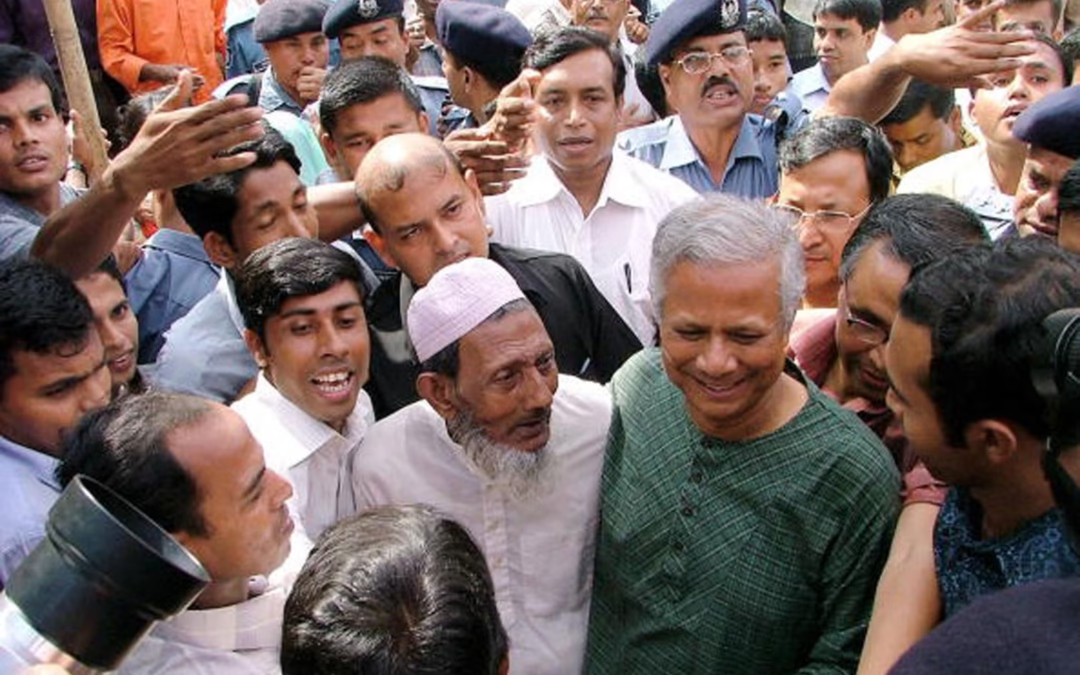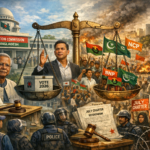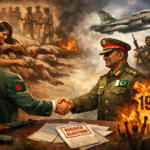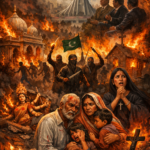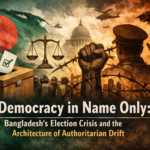Introduction
The Bangladesh Armed Forces stand as a pillar of national security, sovereignty, and, to some extent, governance. However, the roots of the military’s ideological and structural composition trace back to an origin that warrants scrutiny. Born from the Liberation War of 1971, the armed forces have often been seen as a counterforce to the legacy of Pakistan’s military establishment. But are they truly free from the ideological shackles of their erstwhile rulers? Or are they, knowingly or unknowingly, still pursuing aspirations inherited from the idol and surrogate fathers of the infamous Pakistan army?
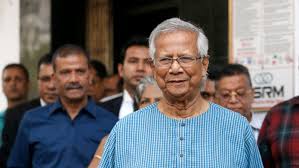

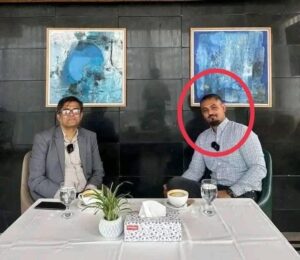

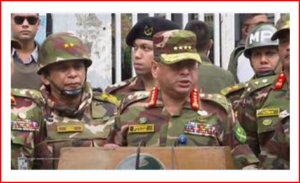
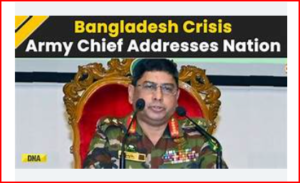
Beyond the military, Bangladesh also finds itself at a crossroads politically and economically. A class of neo-socialists, led by figures such as Dr. Muhammad Yunus, have risen to prominence. With their carefully crafted global image, are these elites genuinely invested in Bangladesh’s future, or do they represent an extension of pseudo-Islamist forces manipulating power for their gain? As they curl their mustaches in anticipation of an iron-fisted rule, is the nation marching towards a stable future, or is everything on the verge of collapse like a house of playing cards?
Bangladesh Armed Forces: A Legacy Revisited
Bangladesh’s military emerged from a resistance movement against the oppressive and genocidal Pakistani military regime in 1971. One would assume that the scars of history would create an institution diametrically opposed to its former rulers. However, a closer analysis reveals enduring similarities in operational structure, training philosophy, and political engagement.
- Structural and Doctrinal Continuity: The Bangladesh military, despite its rebranding, still follows a structural and operational model similar to that of the Pakistan Army. Military doctrines, counter-insurgency strategies, and chain-of-command hierarchies bear striking resemblances to the blueprint laid out by its predecessor.
- Political Intrusions and Power Games: Much like the Pakistan Army, the Bangladesh military has had its fair share of political entanglements. From the coups of 1975 and 1982 to the 2007 military-backed caretaker government, the armed forces have repeatedly inserted themselves into governance, much like their Pakistani counterparts who hold an oversized influence in political matters.
- Ties with International Power Blocs: The role of foreign influences, particularly China, the US, and historically Pakistan, cannot be ignored. The military’s procurement policies, strategic alliances, and training programs remain suspiciously aligned with the interests of powers that have historically opposed Bangladesh’s sovereignty in its early years.
Dr. Yunus and the Neo-Socialist Order: A Threat or a Savior?
Dr. Muhammad Yunus, once hailed as a microfinance pioneer, has seen his image shift from a Nobel Laureate to a political manipulator. His growing influence among the country’s elite and international institutions raises the question: does his vision align with Bangladesh’s national interests, or does it serve a globalist, neo-socialist agenda that prioritizes external benefactors over the people of Bangladesh?
- A Wolf in Sheep’s Clothing? While Yunus’ microfinance model was initially praised, it has faced accusations of exploiting the poor rather than alleviating their burdens. The question remains: is he genuinely invested in uplifting Bangladesh’s economy, or is he merely a tool for foreign capitalists and NGOs using microfinance as a gateway to control local economies?
- Ties with Pseudo-Islamists: Yunus’ affiliations and growing proximity to so-called moderate Islamist factions raise concerns. Is he merely leveraging these groups for political convenience, or does he represent a deeper confluence of Western neoliberalism and Islamist interests?
- An Iron-Fisted Future: As the political elite consolidates power, with technocrats and corporate-backed figures like Yunus positioning themselves as the faces of progress, are we seeing the emergence of a new autocratic order? With opposition voices being silenced and economic policies being crafted to suit a select few, does Bangladesh stand at the brink of neo-feudalism?
The Looming Collapse: A Nation on a Fragile Foundation?
Bangladesh has made remarkable strides in economic growth, infrastructural development, and social progress. However, behind this glittering facade lies a fragile political and institutional framework that could easily unravel. Several fault lines indicate an impending collapse:
- Economic Vulnerabilities: Despite GDP growth, Bangladesh faces mounting external debt, currency devaluation, and rising unemployment. The reliance on export-driven industries, particularly the garment sector, makes the economy highly susceptible to global fluctuations.
- Authoritarian Governance and Crackdowns: The political landscape is increasingly marked by suppression of opposition, media censorship, and electoral engineering. Such moves indicate a leadership more concerned with power retention than genuine democratic governance.
- Military’s Role in Politics: The armed forces’ continued involvement in governance—whether through direct intervention or behind-the-scenes maneuvering—raises concerns about the country’s democratic integrity.
- Rise of Extremism: The growing influence of Islamist factions, despite government crackdowns, poses a latent threat to national stability. If left unchecked, these elements could further destabilize the socio-political equilibrium.
Conclusion
The Bangladesh Armed Forces, while historically positioned as defenders of sovereignty, continue to exhibit troubling parallels with their Pakistani predecessors. The political landscape is no less concerning, with figures like Dr. Yunus and his pseudo-Islamist allies maneuvering for control. As the ruling elite consolidates power with an iron grip, the question remains: is Bangladesh marching towards stability, or is it on the brink of collapse?
Only time will tell whether the nation can escape the shadow of its past and forge a truly independent path or whether it will succumb to internal and external forces conspiring to dictate its fate.
Footnotes:
- Riaz, Ali. Bangladesh: A Political History. Cambridge University Press, 2022.
- Jahan, Rounaq. Political Parties in Bangladesh: Challenges of Democracy. University Press Limited, 2015.
- Abbas, Hassan. Pakistan’s Drift into Extremism: Allah, the Army, and America’s War on Terror. Yale University Press, 2005.
- Rashid, Harun Ur. Inside Bangladesh Politics: Money, Power & Muscle. Academic Press, 2017.
Bibliography:
- Ahmed, Nizam. The Military and Democracy in Bangladesh: Political and Security Perspectives. Routledge, 2013.
- Fair, C. Christine. Fighting to the End: The Pakistan Army’s Way of War. Oxford University Press, 2014.
- Maniruzzaman, Talukder. Military Withdrawal from Politics: A Comparative Study. Harvard University Press, 1987.
- Rahman, Anisur. Microfinance and Its Discontents: Women in Debt in Bangladesh. Cambridge University Press, 2019

